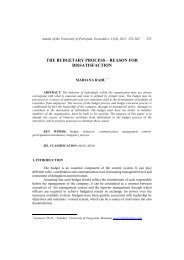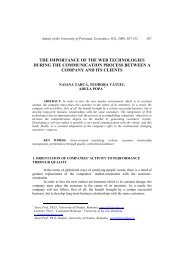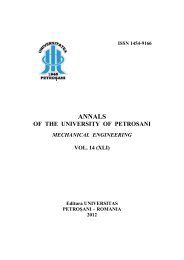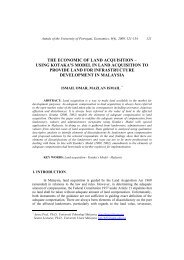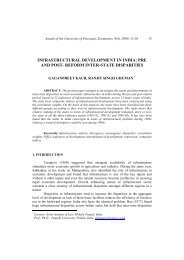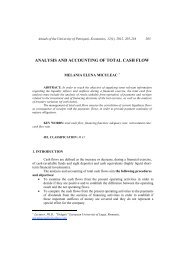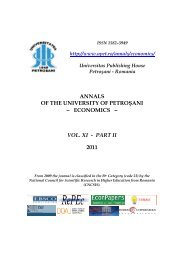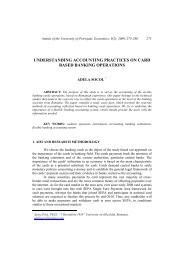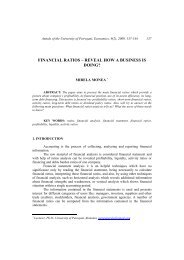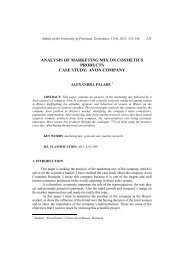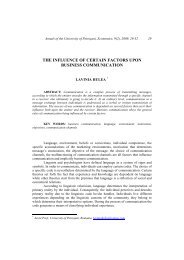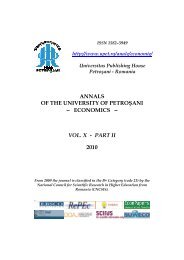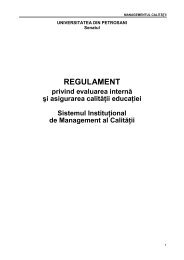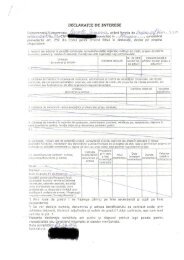annals of the university of petroÅani â¼ economics â¼ vol. xi - part i ...
annals of the university of petroÅani â¼ economics â¼ vol. xi - part i ...
annals of the university of petroÅani â¼ economics â¼ vol. xi - part i ...
Create successful ePaper yourself
Turn your PDF publications into a flip-book with our unique Google optimized e-Paper software.
A Review <strong>of</strong> Financial Regulations to Avoid <strong>the</strong> Nationalisation <strong>of</strong> … 285<br />
5. REGULATIONS TO AVOID THE NATIONALISATION OF LOSSES<br />
As explained above, banks losses are due to complex reasons, and authorities<br />
must adopt measures to minimize <strong>the</strong> system problems. The Banking Law Committee<br />
recommends surveillance focused on bank solidity, risk and transparency. In case <strong>of</strong><br />
financial crisis, The Crisis Management Authority should be ready to act and provide<br />
efficient coordination between all institutions managing <strong>the</strong> crisis (Viotti, 2000).<br />
Market discipline is vital to <strong>the</strong> national financial system, and it includes<br />
investors’ possibility to monitor actions and influence managers. The Basel Committee<br />
on Banking Supervision (1999, pp.17) considered that “market discipline imposes<br />
strong incentives on banks to conduct <strong>the</strong>ir business in a safe, sound and efficient<br />
manner”, and explained that a transparent bank gains more trust from market investors<br />
and more help in a secure investing. Market discipline <strong>of</strong>fers information about banks<br />
performance, risk pr<strong>of</strong>ile, risk management, and data which allows entrepreneurs to<br />
make well-founded risk-assessments.<br />
The risk taken by banks differs. Commercial banks can easily go bankrupt<br />
because <strong>the</strong>y weaken when a large number <strong>of</strong> depositors clear <strong>the</strong>ir accounts. The lost<br />
summed from investment banks are times bigger as <strong>the</strong> commercial banks losses. The<br />
effects <strong>of</strong> <strong>the</strong> systemic risk should be suppressed with “a brake on its carriers and<br />
require all products over a certain <strong>vol</strong>ume to be traded on an exchange ra<strong>the</strong>r than over<br />
<strong>the</strong> counter or, at a minimum, to create a mandatory central clearing house for <strong>the</strong>m”<br />
(Butler &Patrick, 2009, pp.71). When banks figures are beyond banks capital<br />
requirements, regulations like restricting bonuses and payments should be applied,<br />
until proper ratios are achieved. Reestablishing secured ratios may be realized through<br />
raising capital or disposing <strong>the</strong> high risky assets. Regulators should encourage capital<br />
use, but with limitation for its use in investments, for example a percentage <strong>of</strong> pr<strong>of</strong>its.<br />
Fur<strong>the</strong>rmore, banks must discover risky assets and isolate <strong>the</strong>m (Peter, 2009).<br />
Financial liberalisation made national banks more dependent on international<br />
loans, as <strong>the</strong>y became cheaper; hence, <strong>the</strong> system weaknesses were duplicated between<br />
banks, increasing <strong>the</strong>ir vulnerability. The liberalisation process ensures <strong>the</strong> market<br />
freedom whilst interest rates go up, raising <strong>the</strong> credit cost, and finally, causing an<br />
economic crash (Krohn, 2008). To avoid becoming “too big to fail”, all banks should<br />
be monitored, and in case <strong>of</strong> fraud and corruption, <strong>the</strong>y must be vanished as soon as<br />
possible. For a better control, authorities should send signals to bankers to make <strong>the</strong>m<br />
conscious <strong>of</strong> <strong>the</strong> penalties given in case <strong>of</strong> improper banking behavior. Poor<br />
management may lead to wrong decisions such as allowing bank resources exploitation<br />
or taking excessive risks for quick pr<strong>of</strong>its. The growth rate in banks needs limitation,<br />
o<strong>the</strong>rwise bankers will use gambling to get instant earnings. Ano<strong>the</strong>r way to prevent<br />
bank gambling is to <strong>of</strong>fer better choices to invest money in and lower intermediation<br />
costs (Hellmann, et al., 2000).<br />
When deposit insurance is used for non-monitored banks, <strong>the</strong> risk is transferred<br />
to taxpayers. If a society is not ready to protect itself, in order to save insolvent banks<br />
ano<strong>the</strong>r way than providing a security blanket should be used (Mayes, 2005). The<br />
market evaluation is more simple and effective when deposit insurance e<strong>xi</strong>sts, as <strong>the</strong>



